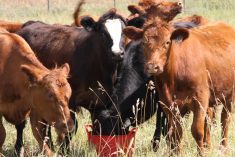Bunnie Harasym wants to shed light on what she calls Canada’s dirty little secret.
For the past 10 years, Harasym has been volunteering her time and money to save unwanted horses from slaughter.
“This country was built on horseback,” she said.
“We fought wars on horseback and this is how we treat them?”
Harasym runs a small rescue service for unwanted horses called Paradise Stable Horse Rescue.
Her stable, a few kilometres north of Saskatoon, is dedicated to keeping unwanted and neglected horses out of Canadian slaughter plants, nursing sick animals back to health and finding them new homes with responsible owners.
Read Also

Organic farmers urged to make better use of trade deals
Organic growers should be singing CUSMA’s praises, according to the Canadian Chamber of Commerce.
According to Agriculture Canada, Canadian slaughter plants have killed more than 200,000 horses over the past two years to supply domestic and foreign markets for horse meat.
Five years ago, Canadian slaughter numbers stood at about 50,000 horses per year, about half of what they are today.
Slaughter numbers doubled in mid-2007, shortly after American legislators made it illegal to slaughter horses for meat in the United States.
The U.S. ban has resulted in more unwanted horses being shipped out of the United States to slaughter facilities in Canada and Mexico.
Harasym considers the shipment and slaughter of unwanted horses inhumane and unnecessary.
She said some horses that have worked productively all their lives are sent to auction in poor condition and sold for less than $100 rather than being retired or humanely euthanized. In other cases, slaughter horses are young and healthy but simply unwanted.
Since Harasym and her husband, Lawrence, started Paradise Stable about a decade ago, the two have sunk an estimated $500,000 of their own money into the venture.
The have also spent thousands of hours keeping the operation afloat, often working 50 hours a week to ensure their rescues are healthy and comfortable.
Harasym isn’t opposed to using horses as working animals or euthanizing them if they are old, sickly or unwanted.
However, she disagrees with the slaughter of horses that were bred for the wrong reasons, mistreated, abused, neglected or shipped to auction by owners who are unaware of how the Canadian horse slaughter industry operates.
Harasym said horses that end up at Canadian slaughter plants include more than the old, lame and sick.
Many are castoffs of professional horse breeders who hope to breed perfect horses for high-end buyers and the racing industry.
Horses that don’t meet exacting standards often end up at public auctions.
“It’s not the farmer who has a stallion running around in his pasture who’s keeping the slaughter industry going,” she said.
“In most cases, it’s breeders who are breeding for the perfect horse. There’s no market out there right now for the perfect horse and there’s way too many unwanted horses that end up at auctions.
“The unnecessary breeding of these horses has got to stop and if it doesn’t, this is what you end up with.”
Harasym said the price of horses is historically low and the supply of unwanted horses is high.
As a result, meat buyers are routinely buying slaughter animals for $25 to $200.
When Harasym attends an auction, she often bids on animals that are in poor physical condition and unlikely to survive the journey to the slaughter plants.
Meat buyers often ridicule her when she bids successfully, she said.
Recreational horse owners who provide good homes for their animals until the cost and effort becomes unmanageable also contribute to the problem.
She said the public has no idea how many recreational horses end up in meat buyers’ trailers.
“The public has to be educated,” she said. “Not all people that send their horses to auction know that those animals are probably going to slaughter.
“A lot of people don’t know about the Canadian horse meat industry and when you start telling them, they don’t want to hear about it. That’s why we call it Canada’s dirty little secret.”
Harasym said running a rescue can be both gratifying and depressing. For every animal she saves, thousands more are processed and shipped abroad, primarily to meat markets in Europe and Asia.
Harasym’s stable is full to capacity, with 16 horses of different sizes and backgrounds occupying pens a stone’s throw from the couple’s farm house.
“Horse breeders are standing at their gates crying because they’re not getting enough money for slaughter animals. I’m standing here crying because I don’t have enough gates to keep more horses,” she said.















